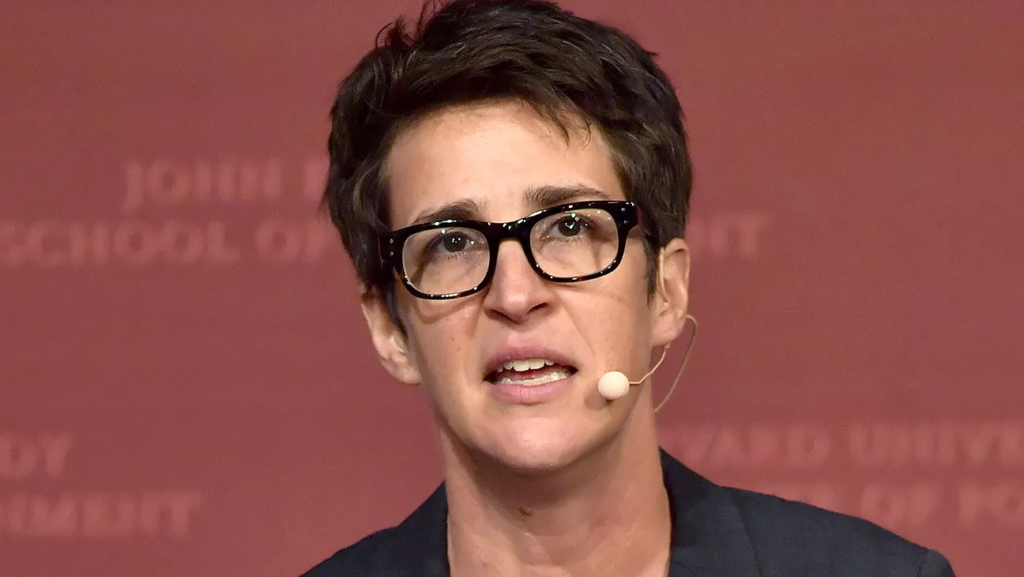It was a moment no one expected, and one that millions of viewers will never forgetOn what seemed like a routine evening broadcast, MSNBC anchor RachelMaddow—known for her razor-sharp commentary and composeddelivery—suddenly found herself unable to speak. As the cameras rolled, shechoked up, her voice faltered, and she struggled through tears. The reason? Abreaking Associated Press report on the U.S. government’s policy of separatingimmigrant children from their parents at the border.
For many, it was the first time they had ever seen Maddow visibly shaken, But whatmade the moment especially powerful was not just the raw emotion—it was thereason behind it.

The date was June 19, 2018. As her show approached its dosing segment, Maddowbegan reading a freshly published AP report, The story revealed that under theTrump administration’s controversial “zero tolerance” immigration policy, veryyoung children—including babies and toddlers Were being forcibly removed fromtheir parents and placed in what were called “tender age” shelters in South Texas“Officials have been sending babies and other young children…” Maddow began,before pausing, dearly struggling to continue. She attempted again: “to at leastthree…” But the words failed her. A deep silence filled the screen
The gravity of what she had just read—images of terrified, crying children takenfrom their families and placed in institutional care—was simply too much. Withvisible emotion, Maddow signaled to her producers to go to a graphic. The screenremained blank. She then abruptly said, “I think I’m going to hand this off. Sorry.That’s it for tonight.”
And with that, she passed the broadcast to her colleague Lawrence O’Donnell, livefrom Brownsville, Texas, and waved off the camera, tears in her eyes.
The impact was immediate. Viewers across the country were left stunned—not onlyby the horrific content of the story but also by Maddow’s genuine, unscriptedreaction. Social media erupted in support, with hashtags like #RachelMaddow and#TenderAgeShelters trending within minutes. For many, her emotional responsevalidated the horror and helplessness they themselves had felt while reading similarstories,
This wasn’t a journalist sensationalizing tragedy. This was a human being bearingwitness to suffering—and it cracked her open on national television

After the broadcast, Maddow took to Twitter to explain what had happened. Herapology was humble and heartfelt, but what stood out most was what she attempted—and failed—to read on air
“Trump administration officials have been sending babies and other young children forcibly separated from their parents at the U.S~Mexico border to at least three ‘tender age’ shelters in South Texas. Lawyers and medical
providers… described play rooms of crying preschool-age children in crisis
She followed that with a tweet that simply read:
“Again, | apologize for losing it there for a moment. Not the way | intended that to go, not by a mile!”
Her message didn’t just convey remorse—it underscored the gravity of the
situation. These weren’t statistics. They were children—frightened, disoriented, and.
alone.
Rachel Maddow is known for her incisive political analysis and tough interviews, but
this moment peeled back the curtain on the person behind the podium. ft reminded
the world that journalism, at its core, is about people—about witnessing, about
truth, about justice.
And sometimes, the truth is so harrowing that even the most seasoned
professionals can’t suppress the very real emotions it evokes.
Maddow’s breakdown was not a sign of weakness. ft was a testament to her
humanity. t spoke volumes about the emotional toll of covering inhumane policies,
and why journalism must never become desensitized to suffering.

Though Maddow quickly resumed her duties in the days that followed, that broadcast would become one of the most talked-about moments in modem journalism. It was replayed, analyzed, and dted in discussions about the moral consequences of immigration policy. Her tears became a symbol—not of defeat,but of conscience.
Viewers saw in her the reflection of their own outrage. Politicians and pundits may argue, but Maddow’s reaction cut through the noise. It reminded the nation that behind every policy is a human life, and sometimes, the cost is just too high to bear
in silence.
As Maddow once said in anather context, “The story will break your heart. But that
doesn’t mean we look away.”
She didn’t, And neither should we.

